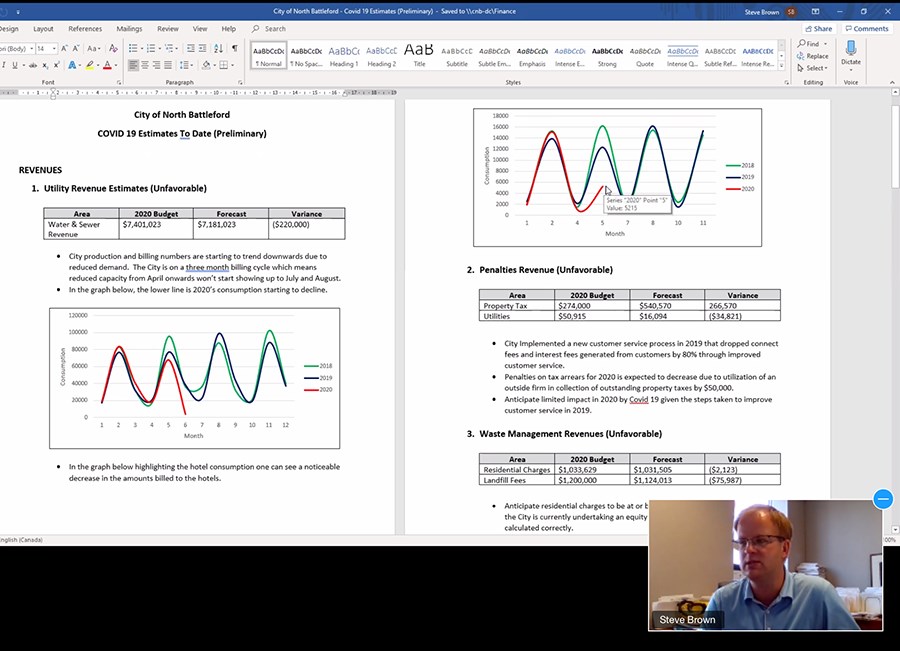City council in North Battleford got the latest news last Thursday about the fiscal impact of COVID-19 on City Hall.
“We’ve got some pain on the horizon yet,” was the reaction of Director of Finance Steve Brown about the situation. He described it as being on the “outer band” of the fiscal storm.
On the one hand, revenues were down, but expenses were reduced even more due largely to temporary layoffs of staff, for savings of over $653,000.
“I believe we might be one of the few municipalities in Saskatchewan coming out of the first phase with some financial flexibility to go into the second phase,” said Brown. There would be some wiggle room, he said, so they don’t have to go into reserves or go for large tax increases.
On the flip side, there are challenges coming down the road for the city due to an anticipated reduction in municipal revenue sharing as well as labour and RCMP increases.
Brown walked councillors through each area of city operations and where the impacts were being felt.
For utilities, they were looking at revenues being down $220,000, due to consumption falling below previous years. The budget for 2020 had forecast revenues of $7,401,023; the new revenue forecast is for $7,181,023.
It was noted that consumption of water was way down at the hotels, which had been closed for much of the early part of the pandemic. The one piece of good news was that property tax penalties revenue was going to be up, from $274,000 to $540,570.
For waste management revenue, that is also down. The landfill fees forecast is down almost $75,000 to $1,124,013.
An area taking a big hit was recreation revenues. The budget had forecast revenues of $2,259,000, but now the projection is $1,767,460, due to the closure of city facilities from March until August.
Parking ticket revenues are down, from $203,981 to $151,181, which Brown said was “100 per cent related to the pandemic.” Interest income was also down as well, and there is no anticipated change to transit.
On the other hand, the city was able to more than offset those losses by saving $1,251,863 in corporate wages due to the temporary reductions in staff. The city is also saving about $177,722 in recreation supplies and $56,256 in fuel, and is also looking at a small increase in business licences revenues.
When those savings were combined with the other revenue reductions, the city ended up on the plus side of the ledger with savings of $653,884. That gives the city a bit of cash flow, said Brown, going into the next phase.
There are some potential impacts in the next 18 months to two years, however. One is a hit coming to future revenue sharing from the province, with an estimated $346,420 reduction coming between 2020 and 2022.
Another impact identified is ongoing labour negotiations for the RCMP contract. Brown estimates this as coming to around $645,950. They are also estimating labour costs to go up $421,548 in the next two years as well.
In total, those cost impacts come to $1,413,918 in the next two years. “We have time to plan for it and look for ways to improve it,” said Brown.
Brown concluded by saying the city should keep on with defining levels of service, making the necessary investments in efficiencies, and looking to maintain their cash reserves.



